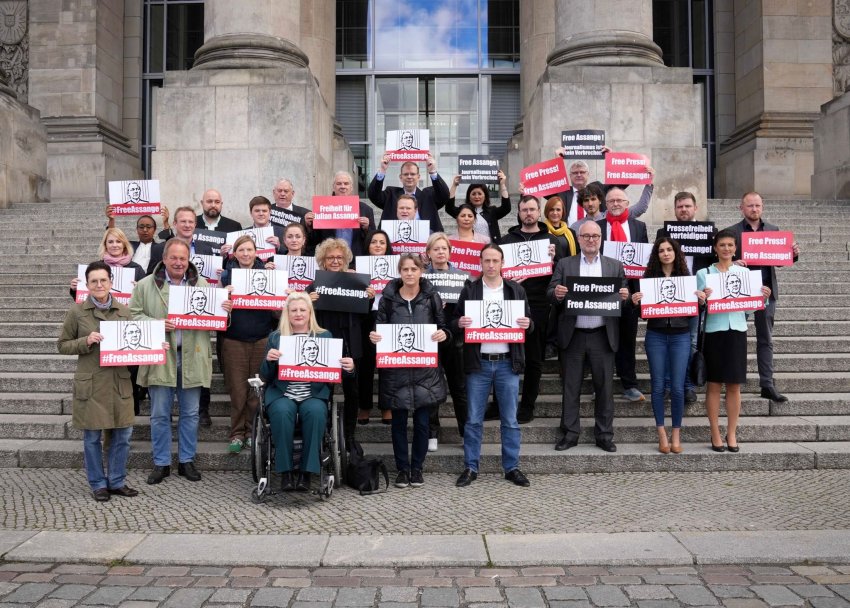
It was telling. Only David Crowe of the Sydney Morning Herald from the mainstream media turned up to the National Press Club to hear from lawyer Jennifer Robinson, who has spent years representing Julian Assange.
That representation has taken an even more urgent note since 2019: to prevent the WikiLeaks founder from being extradited to the United States, where he faces 18 charges, 17 confected from the archaic Espionage Act 1917.
Robinson’s address, titled “Julian Assange, Free Speech and Democracy”, was a grand recapitulation of the political case against the WikiLeaks founder.
Followers of this ever-darkening situation would not have found anything new. Rather the shock was how ignorant many remain about the chapters in this scandalous persecution.
She noted those blackening statements from media organisations and governments that Assange was paranoid and could leave the Ecuadorian Embassy, his abode for seven years, at his own leisure.
Many were subsequently “surprised when Julian was served with a US extradition request”. But this was exactly what WikiLeaks had been warning about for some 10 years.
In the Belmarsh maximum security prison, where Assange has been imprisoned for 3.5 years, his health has declined further.
“Then, last year, during a stressful court appeal hearing, Julian had a mini stroke,” Robinson said. His ailing state did not convince a venal prosecution, tasked with “deriding the medical evidence of Julian’s severe depression and suicidal ideation”.
The matter of his health plays into the issue of lengthy proceedings. Should the High Court not grant leave to hear an appeal against Home Secretary Priti Patel’s decision in June to order Assange’s extradition, processes that could be activated through the British Supreme Court and possibly the European Court of Human Rights.
The latter appeal, should it be required, would depend on the government of the day keeping Britain within the court’s jurisdiction.
“If our appeal fails, Julian will be extradited to the US — where his prison conditions will be at the whim of intelligence agencies which plotted to kill him,” she told the Press Club. An unfair trial would follow, and any legal process citing the First Amendment culminating in a hearing before the US Supreme Court would take years.
The teeth in Robinson’s address lay in the urgency of political action.
Assange is suffering a form of legal and bureaucratic assassination, his life gradually quashed by briefs, reviews, bureaucrats and protocols. “This case needs an urgent political solution. Julian does not have another decade to wait for a legal fix.”
Acknowledging that her reference to the political avenue was unusual for a lawyer, Robinson noted how the language of due process and the rule of law had become ghoulish caricatures in what amounts to a form of punishment.
The law has been fashioned in such an abusive way that a person can now be prosecuted for their journalism.
Despite the British-US Extradition Treaty’s prohibition of extradition for political offences, the US prosecution was making much of the Espionage Act. “Espionage,” stated Robinson, “is a political offence”.
The list of abuses in the prosecution is biblically lengthy. Robinson gave a summary of them: the fabrication of evidence via the Icelandic informant and convicted embezzler and paedophile Sigurdur “Siggi” Thordarson; the deliberate distortion of facts; the unlawful surveillance of Assange and his legal team and matters of medical treatment; “and the seizure of legally privileged material”.
Much ignorance about Assange and the implications of his persecution is no doubt willed. Robinson’s reference to Nils Melzer, the UN Special Rapporteur on Torture, was apt.
Melzer was initially sceptical about the torture complaint made by Assange and his team. He had been convinced by the libel against the publisher’s reputation. “But, in 2019, he agreed to read our complaint. And what he read shocked him and forced him to confront his own prejudice.”
Melzer would subsequently observe that, in the course of two decades working “with victims of war, violence and political persecution, I have never seen a group of democratic States ganging up to deliberately isolate, demonise and abuse a single individual for such a long time and with so little regard for human dignity and the rule of law”.
The obscene conduct by US authorities, whose officials contemplated abducting and murdering a publisher, is an inconvenient smudge of history best ignored.
The Anthony Albanese government, which has continued to extol the AUKUS security pact and prospects of a globalised NATO, seems to have shelved any “political solution” regarding Assange.
Those MPs who did listen to Robinson’s address included Dr Monique Ryan, federal member for the seat of Kooyong and Greens Senators Peter Whish Wilson and David Shoebridge. Ryan subsequently tweeted: “An Australian punished by foreign states for acts of journalism? Time for our government to act.”
Others who came were those who have been, or continue to be, targets of the national security state.
The long-suffering figure and target of the Australian security establishment, Bernard Collaery, put in an appearance, as did David McBride, who awaits trial for having exposed alleged atrocities of Australian special service personnel in Afghanistan.
Such individuals have made vital contributions to democratic accountability, of which WikiLeaks stands proud. But any journalism that, as Robinson puts it, subjects “power to scrutiny, and holding it accountable”, is bound to incite the fury of the national security state.
Regarding Assange, will that fury win out?
[Binoy Kampmark currently lectures at RMIT University.]